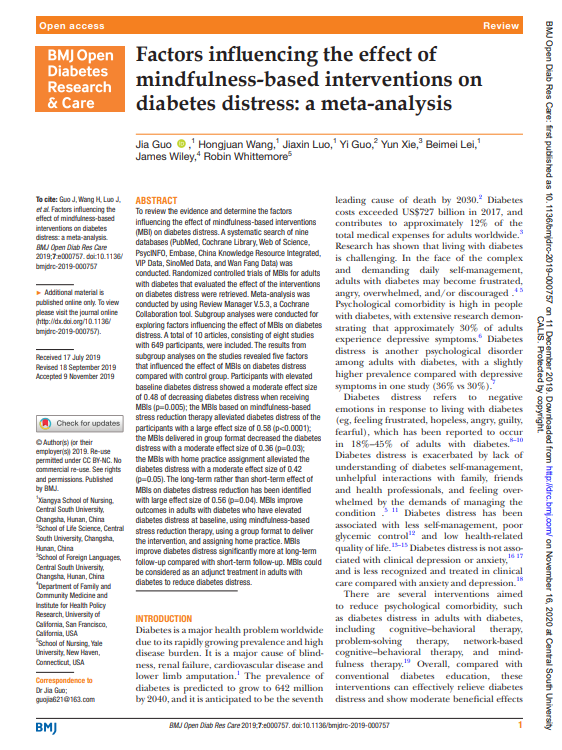Impact Factor:5.067
DOI number:10.1136/bmjdrc-2019-000757
Affiliation of Author(s):中南大学
Journal:BMJ Open Diabetes Research& Care
Place of Publication:英国
Key Words:disease management; health care; nursing care; nursing practice.
Abstract:To review the evidence and determine the factors influencing the effect of mindfulness-based interventions (MBI) on diabetes distress. A systematic search of nine databases (PubMed, Cochrane Library, Web of Science, PsycINFO, Embase, China Knowledge Resource Integrated, VIP Data, SinoMed Data, and Wan Fang Data) was conducted. Randomized controlled trials of MBIs for adults with diabetes that evaluated the effect of the interventions on diabetes distress were retrieved. Meta-analysis was conducted by using Review Manager V.5.3, a Cochrane Collaboration tool. Subgroup analyses were conducted for exploring factors influencing the effect of MBIs on diabetes distress. A total of 10 articles, consisting of eight studies with 649 participants, were included. The results from subgroup analyses on the studies revealed five factors that influenced the effect of MBIs on diabetes distress compared with control group. Participants with elevated baseline diabetes distress showed a moderate effect size of 0.48 of decreasing diabetes distress when receiving MBIs (p=0.005); the MBIs based on mindfulness-based stress reduction therapy alleviated diabetes distress of the participants with a large effect size of 0.58 (p<0.0001); the MBIs delivered in group format decreased the diabetes distress with a moderate effect size of 0.36 (p=0.03); the MBIs with home practice assignment alleviated the diabetes distress with a moderate effect size of 0.42 (p=0.05). The long-term rather than short-term effect of MBIs on diabetes distress reduction has been identified with large effect size of 0.56 (p=0.04). MBIs improve outcomes in adults with diabetes who have elevated diabetes distress at baseline, using mindfulness-based stress reduction therapy, using a group format to deliver the intervention, and assigning home practice. MBIs improve diabetes distress significantly more at long-term follow-up compared with short-term follow-up. MBIs could be considered as an adjunct treatment in adults with diabetes to reduce diabetes distress.
Note:Q1区
Co-author:Hongjuan Wang, Jiaxin Luo, Yi Guo, Yun Xie, Beimei Lei, James Wiley, Robin Whittemore
First Author:Jia Guo
Indexed by:Journal paper
Correspondence Author:Jia Guo
Discipline:护理学
Document Type:J
Volume:7
Issue:1
Page Number:e000757
Translation or Not:no
Included Journals:SCI


